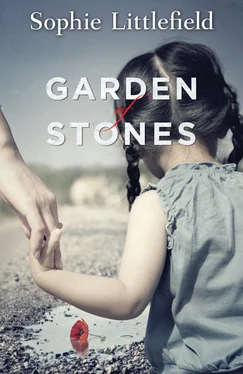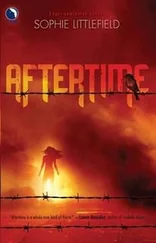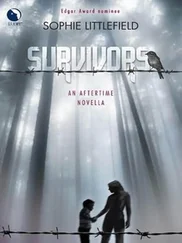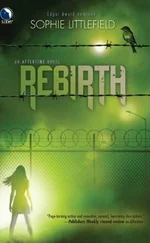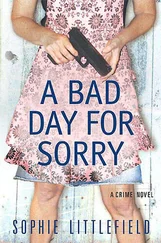She tried the back door and found it locked. Peering through a grimy window, she saw a small kitchen with an old-fashioned fridge, a neat row of empty beer cans on a short strip of countertop, a healthy-looking houseplant trailing leaves from a macramé hanger in the corner.
“You the girl?”
The voice came from the side of the house. Startled, Patty whipped around and saw a pair of old, cracked-leather brogues, no socks, skinny legs. A figure emerged from behind the untamed oleanders: an old lady with gray hair clouding around her shoulders. She wore a man’s work shirt and a skirt that hung on her hips. “You that girl?” she repeated. “Kinah’s friend?”
Patty’s heart had begun pounding the second the old woman spoke, but now she saw that there might be an opportunity. Maybe she could find out something about Forrest from his landlady.
“Uh...” she said, stalling.
“’Cause I expected you yesterday.” A bit of spittle arced from the woman’s mouth. Patty stepped back.
“I’m sorry I’m late.”
“I found his boxes in the garage yesterday,” the old woman continued, as though Patty hadn’t spoken. “I called Kinah and I told her, you come get these or I’m going to throw them out. She acted like she was doing me a favor. The trouble he caused me, police coming around here—and he still owes me two hundred and sixty dollars. I suppose I won’t ever see that money. You got a car?”
“Excuse me?”
“You’re gonna need a car for the boxes. They’re heavy. I don’t want that junk on my porch.”
Patty thought of Jay’s car, his beloved red TR7. Its tiny trunk was already full of his soccer gear, and besides, he’d driven it to the airport and left it in long-term parking. “I thought I’d just take a look first, maybe, see what was there?”
The old woman frowned. “I told her I’m going to throw it out. I’m going to leave it on the porch, and if it isn’t gone by tomorrow I’m going to put it in the can. Don’t be knocking later when you come back—I got my bridge ladies coming.”
“All right. I’m sorry, I didn’t mean to trouble you. Can I just take a look for now?”
“Okay, but I have to get ready. I don’t have time to stand around. You come back and take all that stuff, you hear? And tell Kinah to quit calling me.”
The old woman stumped back up the path, and Patty raced to help her, holding back branches as best she could. Around front, the landlady made her way up the steps to the cracked and peeling porch, pausing at each step to drag her leg up, holding on to the rail with both hands. Next to the front door, Patty could see two water-stained cardboard boxes overflowing with junk.
“I don’t know what’s even in there,” the old woman said, steadying herself with a hand on the doorjamb and breathing hard. “He had it down the cellar six, maybe eight years. I forgot it was there when the cops were here. I’m just glad he did it at work instead of in my house. I’d never get the blood out of the carpets.”
“You think it was suicide?” Patty asked, sifting through a tangle of electric cords, a trophy, a metal stein with a beer logo etched on its surface.
“Mmm-hmm, that man was unstable. Him and Kinah, and before that, the other one. I forget her name. Besides, I don’t know who’d take the trouble to kill him. He didn’t have anybody else besides that simple boy of his, and he hasn’t been around in a long time.”
Patty wasn’t really listening. She’d sifted through the first box and found nothing interesting, but in the second, stacked neatly along one edge, were two old photo albums. She lifted them out carefully, brushing off spiderwebs and dust, and turned them over on her lap. 1939–1940 was inked in neat block letters in Magic Marker on the cloth cover of the first.
On the second was written “MANZANAR.”
9
Manzanar, Inyo County, California
March 1942
The first night in their new home, Lucy learned that the camp had a thousand different sounds.
Back in their house on Clement Street, night was the music of a small ensemble. The ticking of the furnace, the groaning of the old walls settling on their foundation, branches from the cherry tree scratching her window when the wind blew, and the squeaking of the floorboards and flush of the toilet when her parents got up in the middle of the night to use the bathroom. All these sounds blended together in a familiar way, soothing Lucy back to sleep whenever she woke.
But underneath the scratchy, unfamiliar blanket, Lucy shivered from the cold as noises intruded from every direction. A baby in the room next to theirs cried almost the whole night through, and Lucy heard every one of its mother’s desperate, hushed whispers through the flimsy wall. She heard murmured conversations farther down the barrack. Her mother sighed in her sleep, and when she turned, the metal cot squeaked. Several times during the night, people went to the latrine, and then Lucy heard the door opening and closing, and muffled coughing as the night air filled lungs unaccustomed to such cold.
Deep in the night, the wind picked up, and sand flung itself against the barrack’s walls and windows, the sound like an angry waterfall. Lucy could feel the rush of cold wind through gaps in the boards and then—shocking and sudden—grains of sand against her cheek. It blew up from the floor, from between the rough boards.
Lucy didn’t think she would ever sleep. But somehow, she woke with sun streaming in on her face, her eyelashes stiff with tears.
Everything was terrible at first: there were long lines for every meal, and even when a two-shift system was put into place, there was always a wait. The food seemed merely unappetizing to Lucy, but for those accustomed to a traditional Japanese diet—especially the Issei, those born in Japan—it was practically inedible. One of the first meals featured canned peaches over rice, a combination many could not force themselves to eat, to the consternation of the Caucasian cooks, who could not understand that to the Issei the combination was as incongruous as ketchup on cake.
There was also the matter of vaccinations. Everyone was required to receive a typhoid vaccine. Done assembly-line style, the dosages given the children were so high that many were sick and feverish for days. Lucy lay in her cot, fading in and out of awareness, while her mother made repeated trips to the latrine to dampen a cloth for her forehead.
Every few days, a dust storm would pummel the camp. Fine grains swept through the cracks that had formed between the floorboards as they’d cured, and came in through the rough window casings and the gaps between the roof and timbers. The dust was cagey and relentless, and the evacuees scrambled to beat it back, stuffing the cracks with straw and strips torn from rags and anything else they could find. The more enterprising took to nailing lids from food cans in overlapping rows over the cracks. But these measures seemed only to renew the storm’s efforts to find them. The fine grains felt like boulders when they found their way into one’s eyes; they were gritty in one’s teeth, sandy in one’s ears and nostrils.
At night the sound of coughing filled Lucy’s building. Everyone struggled to breathe, from the baby in the next room, whose condition was worsening by the day—her mother waited outside the temporary hospital most mornings to beg the harried doctors for medicine—to the old man at the other end of the hall who sounded like furniture being roughly pushed across a floor.
But by far, the worst of the privations was the public latrine.
On the morning after their arrival, Miyako took Lucy’s hand and they ventured out of the barrack. There were sounds of conversation up and down the row of rooms, but Miyako waited until she was sure no one else was in the hall before they left their own room.
Читать дальше
